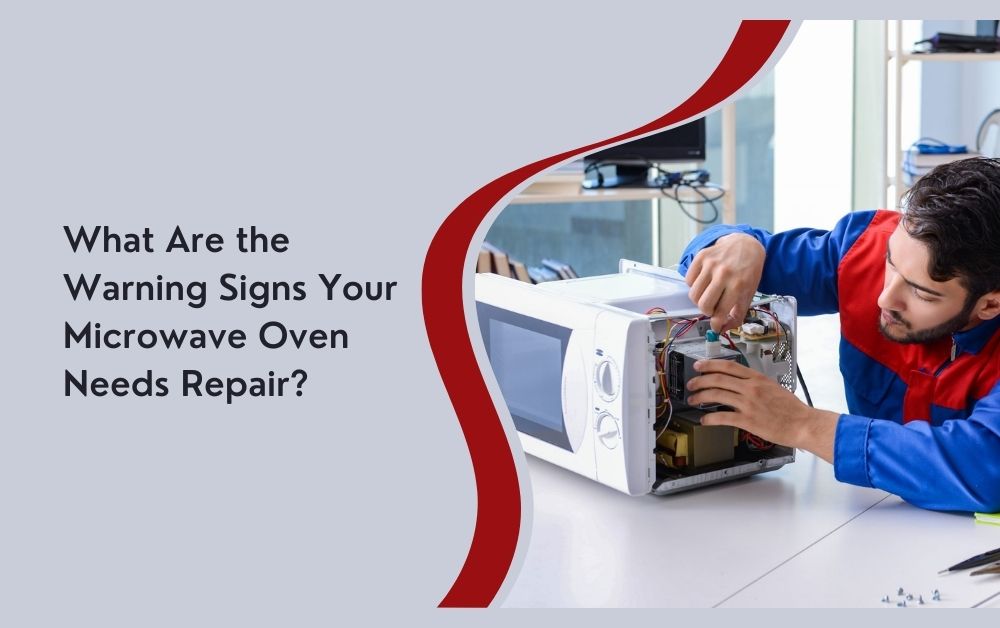Microwave ovens are essential appliances in many households. They make heating food fast and easy. But like all appliances, microwaves can develop problems over time. Knowing the warning signs that your microwave needs repair can save you time, money, and the inconvenience of having it break down completely. This blog will help you understand the common signs that indicate your microwave needs professional attention.
The Microwave Doesn’t Heat Food Properly
Uneven Heating
One of the most obvious signs that your microwave needs repair is when it doesn’t heat food evenly. You might notice that some parts of your food are hot while others remain cold. This uneven heating can be frustrating, especially when you’re in a hurry.
Causes of Uneven Heating
- Faulty Magnetron: The magnetron is the component that generates the microwave’s heat. If it’s not working properly, your food won’t heat evenly.
- Worn-Out Diode: The diode helps the magnetron produce heat. If it’s worn out, it can cause uneven heating.
- Turntable Issues: If the turntable isn’t spinning correctly, it can cause the food to heat unevenly.
The Microwave Takes Longer to Heat Food
If you notice that your microwave is taking longer than usual to heat your food, it could be a sign that something is wrong. This problem can be caused by several factors.
Reasons for Slow Heating
- Weak Magnetron: A weak or failing magnetron can result in longer heating times.
- Voltage Issues: If your microwave is not receiving the proper voltage, it can affect its heating efficiency.
- Dirty Components: Dirt and grease can accumulate inside the microwave, affecting its performance.
Strange Noises Coming from the Microwave
Buzzing or Humming Sounds
Microwaves usually make a consistent humming noise while operating. However, if you start hearing unusual buzzing or humming sounds, it’s a sign that something might be wrong.
Possible Causes
- Magnetron Problems: A faulty magnetron can produce strange noises.
- Transformer Issues: The transformer inside the microwave can also make buzzing sounds if it’s malfunctioning.
- Loose Parts: Loose screws or components inside the microwave can create unusual noises.
Grinding or Clicking Sounds
Grinding or clicking noises are not normal for microwaves. These sounds can indicate a serious problem that needs immediate attention.
What Could Be Wrong?
- Turntable Motor: The motor that turns the microwave’s turntable can wear out and start making grinding noises.
- Fan Issues: The cooling fan inside the microwave can develop problems and make clicking or grinding sounds.
- Internal Damage: Any internal damage to the microwave’s components can result in unusual noises.
The Microwave Door Doesn’t Close Properly
Door Latch Problems
The microwave door needs to close securely for the appliance to work correctly. If the door doesn’t close properly, it can cause the microwave to stop working or operate inefficiently.
Common Issues
- Broken Latch: The latch that keeps the door closed can break, preventing the door from closing securely.
- Misaligned Door: The door can become misaligned over time, making it difficult to close.
- Worn Out Seals: The rubber seals around the door can wear out, causing the door to not close properly.
Safety Concerns
A microwave door that doesn’t close properly is not just an inconvenience; it’s also a safety concern. Microwave radiation can leak out if the door isn’t closed securely, posing a risk to your health.
Safety Tips
- Stop Using the Microwave: If the door doesn’t close properly, stop using the microwave until it’s fixed.
- Get Professional Help: Contact a professional to repair the door and ensure it’s safe to use.
The Microwave Stops Working Suddenly
Power Issues
If your microwave stops working suddenly, it could be due to power issues. This problem can be frustrating, especially if you’re in the middle of cooking.
Possible Power Problems
- Blown Fuse: A blown fuse can cause the microwave to stop working.
- Tripped Circuit Breaker: The circuit breaker that powers the microwave might trip, cutting off the power supply.
- Electrical Faults: Any electrical faults inside the microwave can cause it to stop working suddenly.
Note:- If you’re experiencing any of these warning signs with your microwave, don’t wait until it’s too late! Contact the experts at Microwave Oven Repair Dubai for fast and reliable service. Our skilled technicians can diagnose and fix any microwave issue, ensuring your appliance is back to working efficiently in no time.
Internal Component Failure
The sudden failure of internal components can also cause your microwave to stop working.
Common Failures
- Faulty Magnetron: A magnetron failure can cause the microwave to stop heating and working.
- Broken Transformer: The transformer can break down, leading to the microwave not functioning.
- Control Panel Issues: Problems with the control panel can cause the microwave to stop responding.
The Microwave Display Doesn’t Work
Blank or Flickering Display
The display panel on your microwave provides important information, such as cooking time and power settings. If the display is blank or flickering, it indicates a problem.
Reasons for Display Issues
- Faulty Display Board: The display board can develop faults, causing the screen to go blank or flicker.
- Loose Connections: Loose or damaged connections inside the microwave can affect the display.
- Control Board Problems: Issues with the control board can lead to display problems.
Unresponsive Buttons
If the buttons on your microwave’s control panel are unresponsive, it can be difficult to use the appliance.
What to Check
- Control Panel Damage: Any damage to the control panel can cause the buttons to stop working.
- Electrical Issues: Electrical problems inside the microwave can affect the control panel’s functionality.
- Worn Out Buttons: Over time, the buttons can wear out and become unresponsive.
The Microwave Emits a Burning Smell
Electrical Burning Smell
A burning smell coming from your microwave is a serious warning sign. It indicates that something inside the microwave is overheating or burning.
Possible Causes
- Burnt Wires: Wires inside the microwave can burn due to electrical faults, causing a burning smell.
- Overheating Components: Components like the magnetron or transformer can overheat and emit a burning smell.
- Food Residue: Burnt food residue inside the microwave can also cause a burning smell.
Steps to Take
If you notice a burning smell, it’s important to take immediate action to prevent further damage or a potential fire.
Immediate Actions
- Turn Off the Microwave: Turn off the microwave and unplug it from the power source.
- Inspect for Damage: Check for any visible signs of damage or burnt components.
- Contact a Professional: Get professional help to inspect and repair the microwave.
The Microwave’s Turntable Doesn’t Spin
Stuck or Jammed Turntable
The turntable inside the microwave helps to heat food evenly. If it doesn’t spin, your food might not heat properly.
Reasons for a Stuck Turntable
- Obstructions: Food particles or debris can obstruct the turntable, preventing it from spinning.
- Turntable Motor Issues: The motor that drives the turntable can develop problems, causing it to stop spinning.
- Damaged Turntable: The turntable itself can get damaged or misaligned.
Turntable Makes Noise
If the turntable is making noise while spinning, it indicates a problem that needs attention.
Common Causes
- Worn Out Motor: The motor can wear out over time and start making noise.
- Misaligned Turntable: If the turntable is not aligned correctly, it can create noise while spinning.
- Debris: Debris under the turntable can cause noise and affect its movement.
The Microwave’s Light Doesn’t Work
Light Bulb Issues
The light inside your microwave helps you see the food while it’s cooking. If the light doesn’t work, it can be due to a few common issues.
Possible Problems
- Burnt Out Bulb: The most common reason for the light not working is a burnt-out bulb.
- Faulty Light Socket: The socket that holds the light bulb can develop faults, preventing the bulb from working.
- Electrical Issues: Electrical problems inside the microwave can also affect the light.
Replacing the Light Bulb
If the light bulb is burnt out, you can replace it to restore the light inside the microwave.
Steps to Replace the Bulb
- Unplug the Microwave: Always unplug the microwave before replacing the bulb to ensure safety.
- Remove the Bulb Cover: Open the microwave and remove the cover that protects the bulb.
- Replace the Bulb: Remove the old bulb and replace it with a new one.
- Test the Light: Plug the microwave back in and test the light to ensure it’s working.
The Microwave Causes Sparks
Sparking Inside the Microwave
Seeing sparks inside your microwave can be alarming. Sparking indicates a serious issue that needs immediate attention.
Causes of Sparking
- Metal Objects: Metal objects, like utensils or aluminum foil, can cause sparks inside the microwave.
- Damaged Waveguide Cover: The waveguide cover can get damaged and cause sparks.
- Faulty Components: Faulty components, like the magnetron or high-voltage capacitor, can also cause sparking.
What to Do When You See Sparks
If you see sparks inside your microwave, take immediate action to prevent further damage or a potential fire.
Immediate Steps
- Turn Off the Microwave: Turn off the microwave and unplug it from the power source.
- Remove Metal Objects: If you accidentally placed a metal object inside the microwave, remove it.
- Inspect for Damage: Check for any visible signs of damage or burnt components.
- Contact a Professional: Get professional help to inspect and repair the microwave.
The Microwave Trips the Circuit Breaker
Electrical Overload
If your microwave trips the circuit breaker, it indicates an electrical overload. This problem can be caused by several factors.
Common Causes
- Faulty Wiring: Faulty wiring inside the microwave can cause an electrical overload.
- High Power Consumption: Microwaves that consume a lot of power can trip the circuit breaker.
- Shared Circuit: If the microwave shares a circuit with other high-power appliances, it can cause the breaker to trip.
Safety Concerns
A microwave that trips the circuit breaker poses a safety risk. It can cause electrical shocks or fire hazards.
Safety Tips
- Avoid Using the Microwave: Stop using the microwave until the issue is resolved.
- Get Professional Help: Contact a professional to inspect the microwave and the electrical system.
- Use a Dedicated Circuit: Ensure the microwave has a dedicated circuit to prevent overloading.
Conclusion
Microwave ovens are essential appliances in many households. Recognizing the warning signs that your microwave needs repair can save you from inconvenience and potential hazards. If you notice any of the issues mentioned in this blog, it’s important to take action immediately. Whether it’s uneven heating, strange noises, a faulty door, or any other problem, addressing these signs early can prevent further damage and ensure your microwave continues to function safely and efficiently. Always consider getting professional help for any repairs to ensure the job is done correctly and safely.
For more insightful articles related to this topic, feel free to visit thataiblog.com



